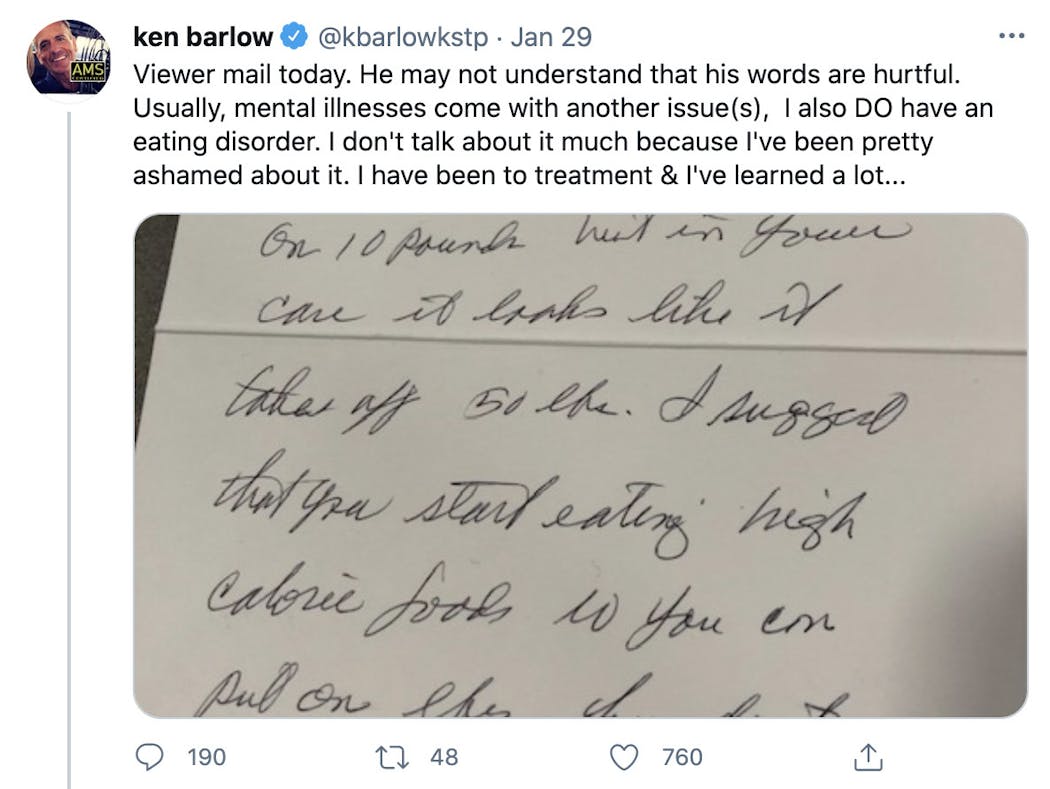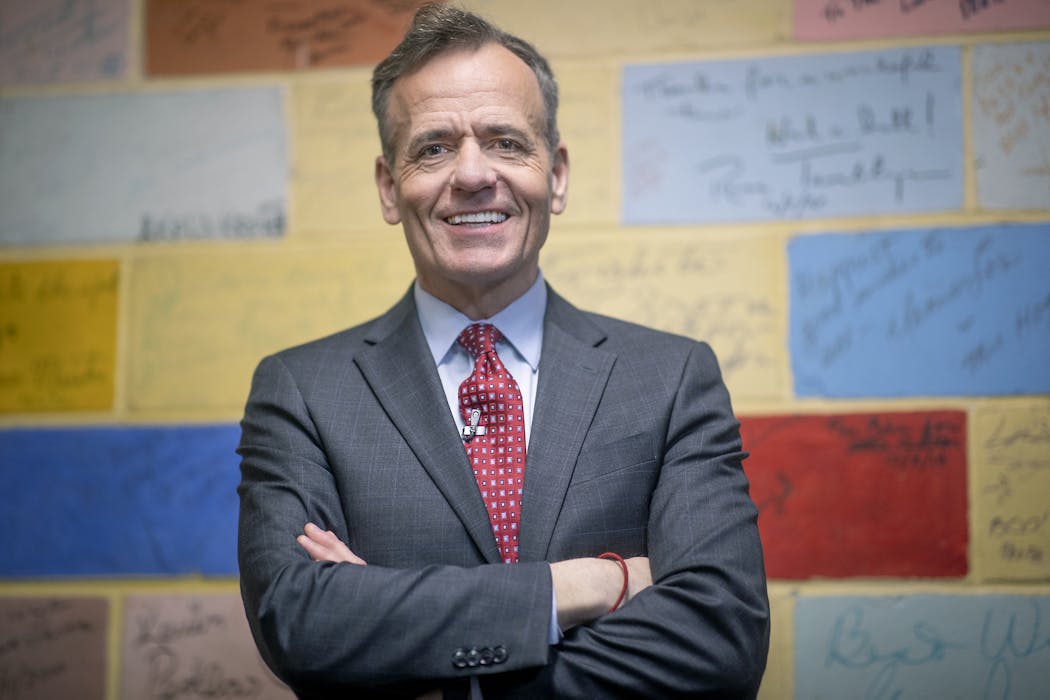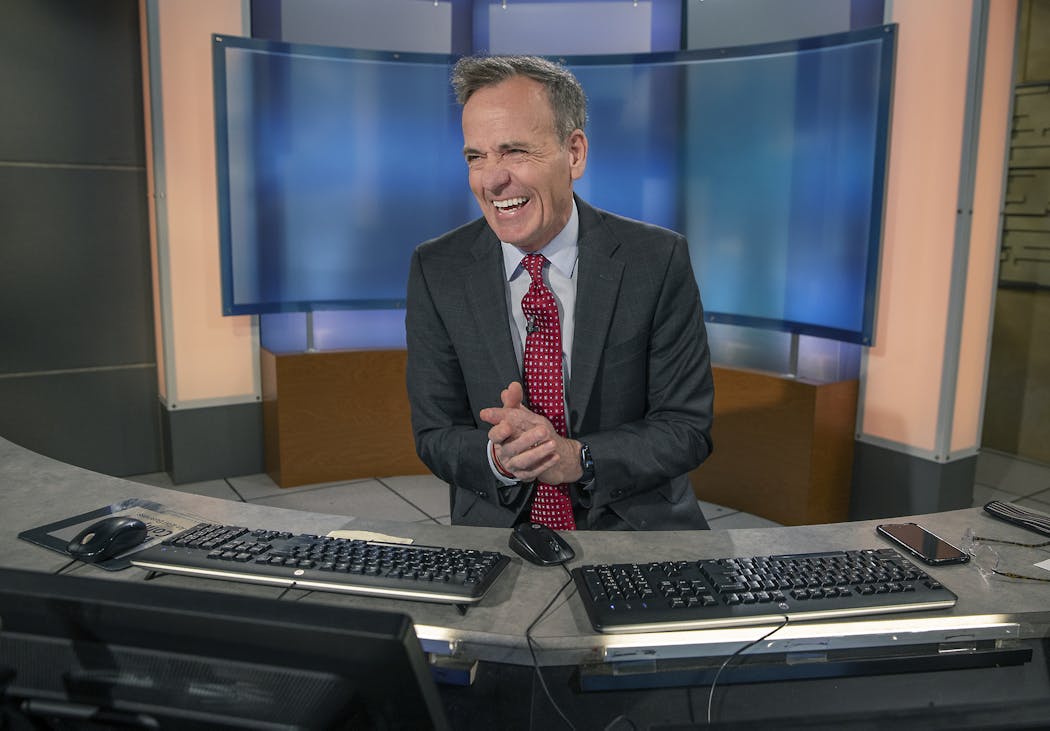Ken Barlow's forecast looked bright in January.
That's when Barlow, 58, earned a career-capping professional promotion.
After a decade on the air at KSTP-TV, he was named the station's chief meteorologist following the retirement of Dave Dahl. Barlow and his wife, Theresa, were managing the disruptions of the pandemic and staying virus-free, as were their three adult children. And there was lots of snow on the radar, always a plus for the self-described "weather geek."
Still, a message from a viewer hit him with the force of an Alberta clipper.
"It got to me. You'd think that after being on television for 33 years, I would have thicker skin, but I'm just human," said Barlow.
The viewer took a sneering shot at Barlow's physique, sending a handwritten note that mocked the meteorologist's body. "I know it's good to stay trim, but you look anorexic. What do you weigh, 90 pounds? I suggest you start eating."
Instead of brushing it off, Barlow took an extraordinary step: He not only posted the missive on his Facebook page, but he also addressed why the remarks cut so deeply.
"I … DO have an eating disorder. I don't talk about it much because I have been pretty ashamed about it," he wrote. "I have been to treatment … more than once. … I've learned that ANYONE can get an eating disorder. Men, women, older folks and teens alike. If you need help please reach out."
It was yet another public revelation from Barlow, who has been upfront about his mental illness diagnoses.
In 2012, while serving as the celebrity emcee of a fundraising walk sponsored by the local chapter of the National Alliance on Mental Illness (NAMI), Barlow disclosed that he lives with an anxiety disorder and Bipolar 1 disorder, also known as manic-depressive disorder.
Since then, in numerous public appearances and keynote speeches, he has detailed his history of trying — and failing — to manage his chronic conditions before seeking help.
He's also talked about the shame that kept him silent until the pain was so great that he could no longer bear it.
"After my dad died, my mom told me he had this, too, but was too embarrassed to even tell me," he said. "I had agreed to emcee the NAMI walk in his honor. That was when I realized I wasn't going to live with that secret."
Courage to share
Barlow's advocacy on behalf of those with mental illness includes high-profile roles with several local organizations, including serving on the board of the Minnesota Mental Health Community Foundation.
"Ken's willingness to share his story takes courage," said Linda Vukelich, executive director of the foundation and the Minnesota Psychiatric Society.
"He's an everyman of sorts and that helps with normalizing conversations about mental health. Ken is your friend, your neighbor, doing his job but also weaving his true story in that, comfortably, willingly, endearingly. His conscious steps can remove unconscious bias."
In his role as KSTP's chief meteorologist, Barlow sets the tone for the five-person weather department, melding the science and the on-camera sizzle for consistency across the station's newscasts.
"With Dave's retirement we were lucky to have someone of Ken's stature and credibility to lead our team," said Kirk Varner, KSTP's news director who elevated Barlow's role.
"His promotion was about his skills. His personal struggle for better mental health was never a consideration. I never stopped and thought, 'Can he do the job?' " Varner said. "The position does have pressures associated with it, but Ken has been forthright about his challenges and is proactive about managing them."
The confidence that Barlow's employers have demonstrated by giving him the lead role is regarded as barrier-breaking by Sue Abderholden, executive director of the Minnesota chapter of NAMI.
"Many people don't talk about their mental illness because they are afraid of discrimination in the workplace, which is still a huge issue. They fear they won't get the raises and good assignments; it happens," she said.
"When we see people moving forward in their careers even after they have shared, maybe that helps others to say, 'I don't need to be afraid, either.' Ken does good work and that's what counted."
In the public eye
Barlow arrived at KARE-TV in 1990 and tracked blizzards, heat waves and thunderstorms at Channel 11 for 15 years.
The Rhode Island native was wooed away by a Boston television station; it was while he was working there that he collapsed, was hospitalized and, at 44, finally diagnosed with his mental illnesses.
Although being born and raised in New England, he and his family had never stopped missing the Twin Cities, and they felt like they were returning home when KSTP came calling.
Barlow has evolved — and aged — before the eyes of a generation of Minnesota viewers, never an easy thing to do.
"Television is a visual medium and there's always been an unfair double standard when it comes to appearance. Men could be older and have that receding hairline, but that's changing. Men are no longer immune to that sort of criticism," said Al Tompkins, senior faculty for broadcast at the Poynter Institute, a nonprofit journalism think tank.
"People on television are quite literally in viewers' bedrooms and living rooms, sometimes for decades. Because the anchors have nosed their way into a viewer's life, some may feel a certain license to make comments they have no business making."
Barlow was back in front of the Minnesota weather map in 2011 when a viewer took to a public forum to comment on Barlow's weight.
"I was at 200 pounds when I came back, up from, like, 165. Someone wrote on Reddit, 'Ken Barlow sure doesn't look like he used to,' and that triggered me," he said. "I wanted to look good for the camera."
To drop pounds he began holding himself to 800 calories a day. He drank diet soda or ate a power bar when he was hungry, started weighing himself a dozen times a day and logged hours on the treadmill.
"I lost a lot of weight fast and I thought I looked good, but my doctor and my therapist were concerned," he said. "In treatment I learned that a man my size needs at least 1,600 calories a day to have your brain and organs working. That got my attention."
Diagnosed with anorexia, Barlow has publicly explained that he has twice sought help with his eating disorder at the Melrose Center. He's worked with a dietitian to set up a food plan and therapists to address his body image issues.
"Having someone who is not only well known, but also male, speak to this is really empowering. There's still a significant stigma about having mental illnesses and seeking help; with men even more so," said Heather Gallivan, clinical director at the Melrose Center. "It keeps them from getting help and getting better."
Gallivan, who was not involved in Barlow's treatment, said that his revelation is valuable in challenging commonly held perceptions that eating disorders strike mostly young women.
"Locally about a third of the people we treat are 35 and older and 15% are men; we have seen a 30% increase in males during the pandemic," she said. "We know that people with eating disorders often have other mental health diagnoses."
Hope for others
Recognizing how a viewer's previous comment set off his unhealthy eating prompted Barlow to reveal the recent nastygram about his body.
"I didn't know the guy on Reddit, but he made me miserable. I wasn't going to let that happen again. I've fought too hard to get stability," he said. "I'm not going to let a stranger make me feel like I have less worth. I went public with it to remind people that words have consequences."
Today Barlow says he "takes pride" in his good health. He eats balanced meals, stays away from the scale, instead paying attention to how his clothes fit. Following knee replacement surgery, he's back to daily workouts, physically active as a runner and swimmer.
"I'm never cocky about my mental health, but I feel like I'm successfully managing it," he said. "I know I'm lucky that I have the resources and ability to take care of it."
When his bipolar disorder was first diagnosed, Barlow recalls looking online for others with the same mental illness and feeling reassured when he saw the names of Winston Churchill and Ben Stiller.
Now he imagines someone in that same situation finding his name.
"When people see us on TV — with the hair, makeup and nice suits — we look perfect. But they'll know I deal with this crap, too. I've had days when I couldn't get out of bed, but here I am today. I'm not phony, I'm just me, that friendly guy who tells you to wear your down jacket. Maybe that can give someone some hope."
Kevyn Burger is a freelance broadcaster and writer.
How to get help: If you or someone you know is struggling with mental illness, contact the National Alliance on Mental Illness or the Minnesota chapter.
Want to celebrate 4/20? Here are 33 weed-themed events across Minnesota.

Dining with altitude: Top-floor restaurants give new meaning to 'high roller' in Las Vegas

Legendary record store site in Minneapolis will soon house a new shop for musicheads








